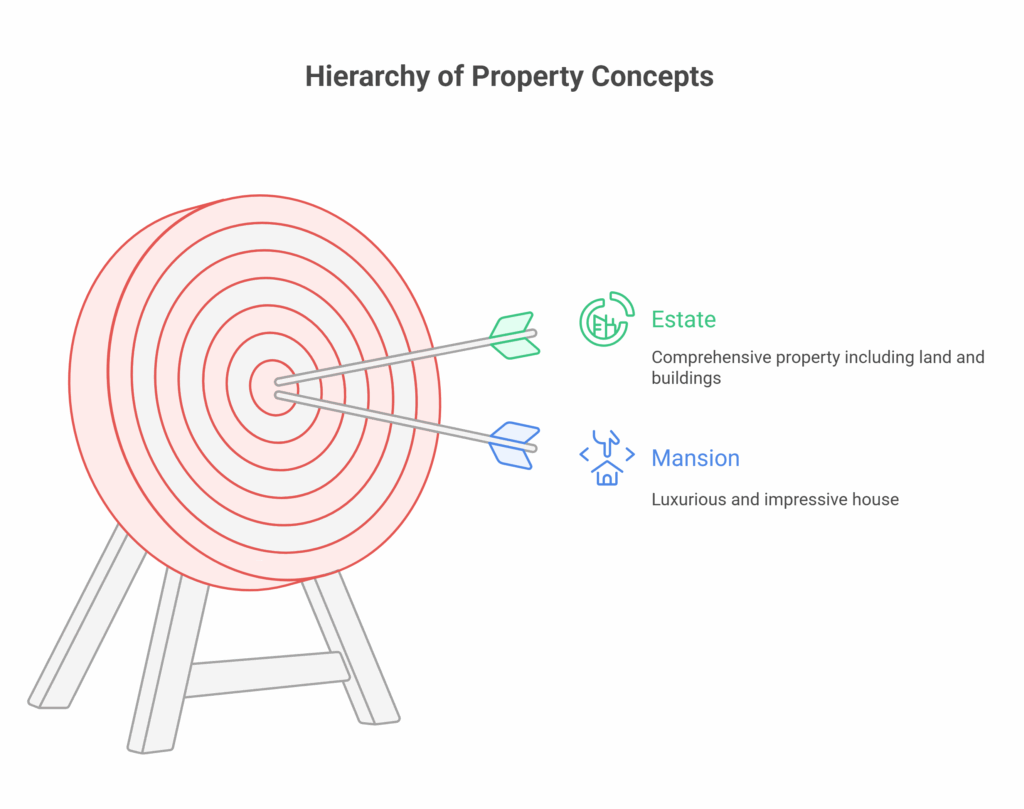Quick Answer: What’s the Difference Between a Mansion and an Estate?
“What’s the Difference Between a Mansion and an Estate?” comes down to more than just size—it’s about function and lifestyle. A mansion typically refers to a very large, luxurious single residence, often boasting high-end features like grand staircases, ballrooms, or private theaters. An estate, on the other hand, goes beyond the home itself. It usually includes expansive land, multiple buildings, and sometimes even working farms, guest houses, or recreational facilities. While every estate might feature a mansion, not every mansion qualifies as part of an estate.
In short, the mansion is the glamorous house you see in movies, while the estate is the entire package—the land, the outbuildings, and the sense of self-contained grandeur. That’s the true difference.
Now let’s dive deeper.

Defining a Mansion
A mansion is generally defined as a large, impressive home with luxury features, expansive square footage, and upscale amenities. The term traditionally refers to a residence that goes beyond the average house in both size and style.
Key Characteristics of a Mansion:
- Size: A mansion typically has at least 5,000 to 8,000 square feet, though in many high-end markets, it can exceed 10,000 square feet.
- Design: Mansions often showcase high-end architecture, multiple stories, grand staircases, elaborate facades, and ornate finishes.
- Amenities: These homes include features such as swimming pools, home theaters, gyms, wine cellars, game rooms, guest wings, and chef’s kitchens.
- Location: Mansions are usually situated in affluent neighborhoods, near golf courses, lakes, or with scenic views.
In short, a mansion focuses on the residential structure itself—its luxury, size, and opulence.
Defining an Estate
An estate, on the other hand, refers not only to the home but to the entire property. It includes the land, outbuildings, and all other structures or amenities that are part of the premises. While an estate may contain a mansion as its main residence, the word “estate” implies a much broader scope.
Key Characteristics of an Estate:
- Land: Estates typically sit on several acres of land, offering privacy, space for expansion, and often lush landscaping or natural features.
- Multiple Structures: Beyond the main house, estates often include guest houses, stables, barns, garages, greenhouses, or private vineyards.
- Functionality: Historically, estates were self-sustaining and could include farmland, orchards, or equestrian facilities.
- Lifestyle: Owning an estate is often about the lifestyle—exclusive privacy, expansive grounds, and room for hobbies like gardening, horse riding, or hosting large events.
Mansion vs. Estate: What Sets Them Apart?
While both are impressive in scale, the primary difference lies in the scope.
- A mansion refers to a large, luxurious home—typically grand in architecture and amenities.
- An estate refers to an entire property, often expansive and with multiple buildings, possibly including a mansion as the centerpiece.
Think of it this way: All estates may include mansions, but not all mansions are estates.
For example, a luxurious 10,000-square-foot home on a half-acre lot in a gated community might be classified as a mansion. In contrast, a property with a 7,000-square-foot home sitting on 50 acres of land with a guesthouse, stables, and a private lake would be considered an estate.
Why the Difference Matters?
Understanding the difference is especially important when buying or selling high-end properties. The classification can impact everything from property value to marketing strategies.
- Property Taxes and Maintenance: Estates usually have higher upkeep costs due to the extensive land and structures. This includes landscaping, security, and staffing.
- Investment Potential: Estates with more land may offer greater long-term investment value due to development potential or resource utilization.
- Buyer Preferences: Some buyers are looking specifically for a private, self-contained estate lifestyle, while others are drawn to the luxury of a large, elegant mansion in a convenient location.
Real estate agents, appraisers, and developers also use these terms with care, especially when targeting potential buyers with specific lifestyle desires.
Choosing the Right Property for You
If you’re in the market for high-end real estate in Texas, understanding your priorities can help narrow your search:
- Want elegance and convenience? A mansion in an upscale neighborhood might be ideal.
- Craving space, privacy, and room to grow? An estate may be a better fit.
Whether you’re a luxury buyer looking to settle in the countryside or near the heart of a major Texas city, knowing the differences between these terms can guide your decisions.
Final Thoughts
Luxury real estate comes in many forms, and both mansions and estates offer unparalleled beauty, space, and amenities. However, the subtle yet important distinctions between the two can greatly influence your experience as a homeowner—or a seller.
As the Texas real estate market continues to grow, more buyers are becoming selective about what they want in a luxury property. Whether you’re looking to purchase a mansion for its architectural grandeur or an estate for its lifestyle benefits, knowing what each offers ensures you’re making the right choice.
If you’re ready to sell your mansion or estate or are actively searching for the perfect luxury property our team can help make the process smooth, professional, and profitable. Connect with experienced house buyers in Texas today and get expert assistance tailored to your property goals. Call us now or visit our website to get started.
Call us anytime at 713-561-5162 or connect with us on our website and we’ll lay out all of your options for your specific situation.
